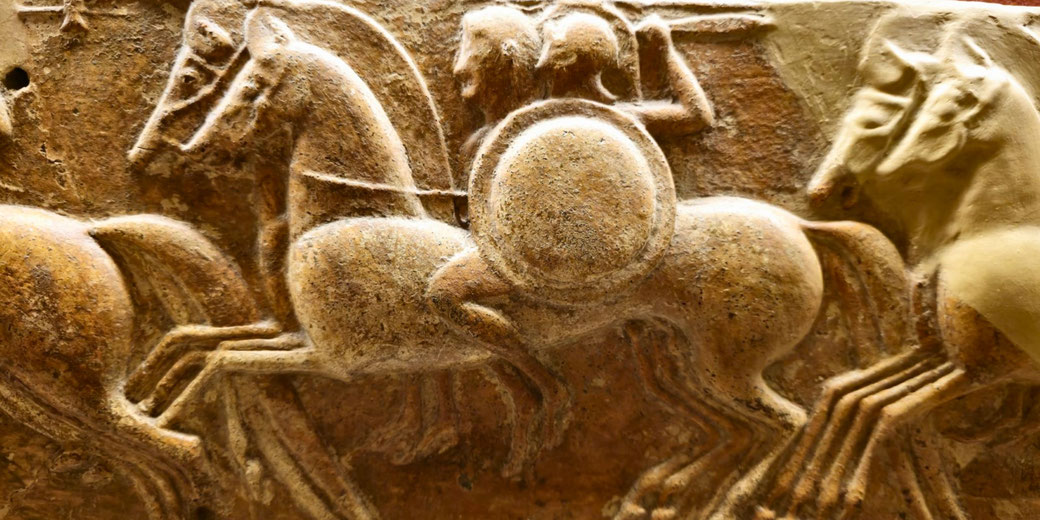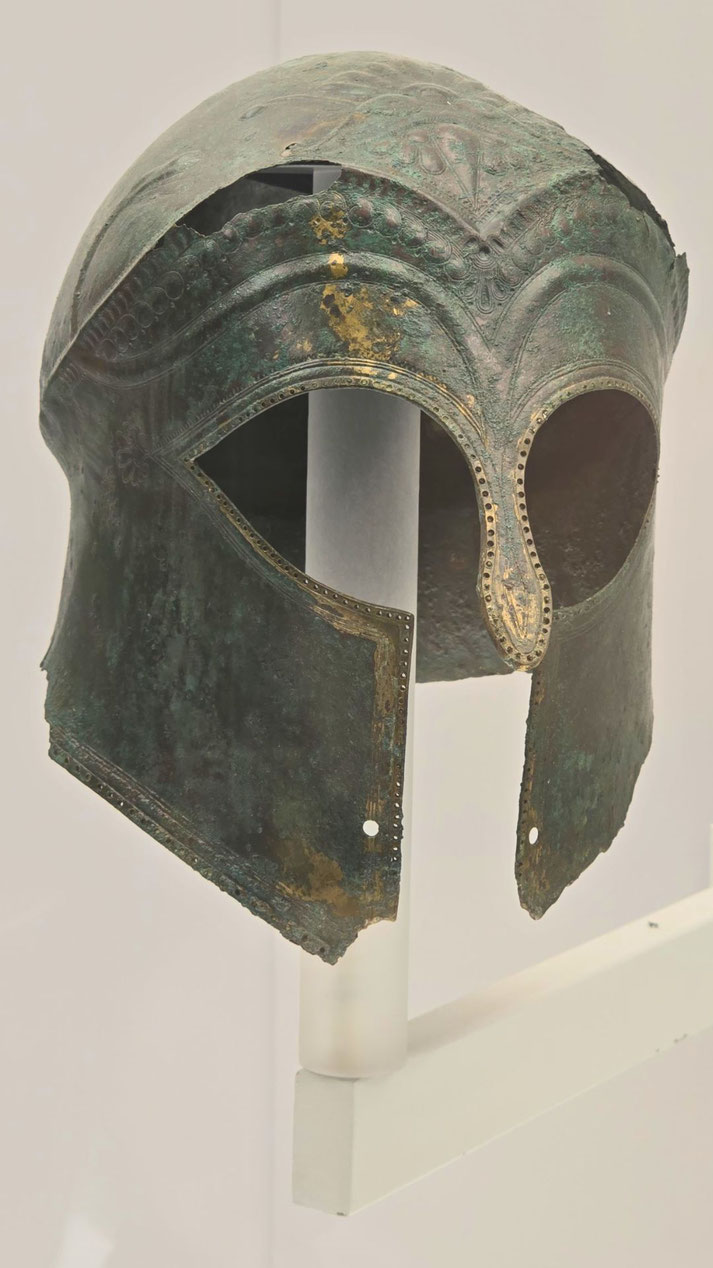How Thebes briefly became the most powerful city-state in ancient Greece

At a time when the ancient city-states of Athens and Sparta were dominating Greek political and military affairs, few could have predicted that Thebes would emerge as one of the most dangerous powers in Greece.
For decades, Thebes had been overshadowed by its more famous neighbors. However, following their remarkable victory at the Battle of Leuctra in 371 BCE, Thebes quickly redefined the balance of power in the region.
Though short-lived, this period became a central hinge point in ancient Greek history.
The history of Thebes before their rise to power
Located in the region of Boeotia, Thebes (modern Thiva) was traditionally one of the leading city-states in central Greece.
In the early 5th century BCE, Thebes had fought on the side of the Persians during the Greco-Persian Wars: a decision that stained its reputation among the other Greek city-states.
After the defeat of the Persians in 479 BCE, it then faced consequences for its collaboration, which led to a decline in its influence.
Thebes attempted to rebuild its standing, but it struggled to shake off the distrust from its neighbors.
Throughout the 5th century BCE, Thebes maintained a difficult competitive relationship with Athens, which often led to conflict.
Then, Thebes’ alliance with Sparta during the Peloponnesian War awarded them some temporary benefits when Athens was defeated in 404 BCE.
After the defeat of Athens, Sparta maintained control over much of central Greece and often used force to ensure its supremacy.
This led to friction with Thebes, which was striving to assert its independence and extend its influence in Boeotia.
This was a region of loosely connected city-states, which were under Theban leadership, but the Thebans often had difficulty controlling these smaller cities.
However, the formation of the Boeotian League in the early 4th century BCE, had provided military and economic support to Thebes.
By the mid-4th century BCE, Thebes found itself at odds with both Athens and Sparta, which led to its involvement in the Corinthian War (395-387 BCE).
Thebes played a significant role in the conflict, which saw the major city-states align against Spartan dominance.
The outcome of the war was inconclusive, but it left Thebes in a stronger position than before.
This period of relative peace allowed Thebes to strengthen its military forces, which became the foundation of its later success.
How Thebes defeated the mighty Spartan army
In 382 BCE, Sparta exacerbated the growing tensions by seizing and occupying the Theban citadel of the Cadmea with Spartan troops.
This caused outrage in Thebes, which saw it as a direct violation of its sovereignty. The Spartan-installed government was unpopular, and resentment grew within Theban society.
Three years later, in 379 BCE, Theban exiles, supported by Athens, orchestrated a successful coup to retake the city.
The final spark for war came when Thebes refused to sign a peace treaty at the conference of 371 BCE.
The treaty required Thebes to disband the Boeotian League and submit to Spartan demands.
Theban leaders, including Epaminondas, rejected these terms, insisting on the independence of the Boeotian League.
Consequently, Sparta, led by King Cleombrotus, marched into Boeotia to punish Thebes and reassert its control.
This culminated in the Battle of Leuctra on July 6, 371 BCE. Under the command of the brilliant Theban general Epaminondas, the Theban army employed a bold strategy which concentrated his forces on one side of the battlefield.
He strengthened his left wing, placing it 50 ranks deep, while the right wing remained deliberately weaker.
This tactic was designed to overwhelm the Spartan right, which was led by their king, Cleombrotus.
The Theban Sacred Band, an elite force of 300 soldiers, played a pivotal role in the victory.
As the Theban left pushed forward, it broke the Spartan line, killing Cleombrotus and causing chaos among the Spartan ranks.
The outcome was a decisive victory for Thebes, with Sparta losing around 1,000 of its elite hoplites, including many of its leaders.
Sparta had never before suffered such a defeat on land, which was its traditional strength.
The defeat weakened Sparta’s influence over the Greek world, allowing other city-states to challenge its dominance.
This victory also emboldened Thebes, which soon embarked on campaigns to liberate cities under Spartan control, including those in Messenia.
The Battle of Leuctra was the beginning of a new era in Greek history, as Thebes rose to a position of unprecedented power.
The Sacred Band of Thebes: A revolutionary military unit
One of the core reasons for the sudden resurgence of Theban military success was the creation of the elite group known as the ‘Sacred Band’ of Thebes.
It was composed of 150 pairs of male lovers who shared a deep bond and, as a result, was believed that they would fight with greater courage and loyalty.
The Sacred Band was renowned for its exceptional training, which meant that it could face larger enemy forces and still emerge victorious.
Each member was equipped with the traditional hoplite armor, including a bronze helmet, breastplate, and a long spear, which was their primary weapon.
The Sacred Band’s tight formation allowed them to withstand even the most aggressive assaults from enemy phalanxes.

Its formation and success were due to a Theban leader named Pelopidas, who was a close ally of Epaminondas.
He personally led this force, both at the Battle of Tegyra (in 375 BCE), at which they defeated a larger Spartan force with his smaller but better-trained army, and the Battle of Leuctra.
In particular, their victory at Leuctra demonstrated the effectiveness of Theban innovations in strategy.
By breaking through the Spartan ranks, the Sacred Band helped secure a decisive victory for Thebes and crippled Sparta’s dominance over Greece.
Theban control of Greece
After their stunning victory at the Battle of Leuctra in 371 BCE, Thebes quickly capitalized on its newfound dominance to extend its influence over other Greek city-states.
Under the guidance of Epaminondas, Theban forces embarked on campaigns across Greece, including an expedition to the Peloponnese, where they liberated Messenia from Spartan control.
The foundation of Messene, a fortified city built by the Thebans, gave the newly freed Messenian helots a stronghold from which they could defend their independence.
In Arcadia, Thebes helped establish the city of Megalopolis, which became a powerful center of resistance against Sparta.
This created a buffer zone that weakened Spartan influence in the region.
Furthermore, Epaminondas also invited neighboring city-states to join the Boeotian League under Theban leadership.
Thebes also turned its attention to Thessaly, where Pelopidas exerted Theban influence through military campaigns and diplomacy.
He defeated Alexander of Pherae, a tyrant who had seized control of the region.
This ensured that it had allies in northern Greece while also curbing the ambitions of local powers that could have posed a threat to Theban supremacy.
The presence of Theban soldiers in Thessaly sent a clear message that Thebes intended to dominate Greek affairs, both in central and northern Greece.
The Battle of Mantinea and the decline of Thebes
However, this rapid expansion of Theban influence unsettled many city-states, particularly Sparta and Athens.
As a result, these cities began to rally opposition to Theban hegemony, leading to a series of conflicts throughout the 360s BCE.
The immediate trigger for another conflict was the shifting allegiance of several Arcadian cities.
Internal divisions within Arcadia weakened its ability to unite, which led some cities to seek Theban protection, while others gravitated toward Spartan influence.
The fluid alliances and betrayals in Arcadia further escalated tensions, and Epaminondas sought to exploit this instability.
He hoped to decisively defeat the Spartan-led coalition at Mantinea, which was a major center of resistance.
By 362 BCE, Epaminondas responded by launching another campaign, determined to break this opposition and reaffirm Thebes’ control.
His forces marched into the Peloponnese region, where Mantinea, an important city in Arcadia, had become the focal point of anti-Theban resistance.
Consequently, both sides met on the plains near Mantinea in 362 BCE.
On the day of the battle, Epaminondas once again arranged his forces in a similar manner to the Battle of Leuctra, placing his strongest troops on the left flank, where he personally commanded them.
Epaminondas launched an aggressive attack against a coalition of forces that included Spartan, Athenian, and Mantinean soldiers.
He initially gained ground and put the coalition forces on the defensive. However, during the course of the battle, Epaminondas was mortally wounded by a spear, which pierced his chest.
His death had a devastating effect on Theban morale, and although the Thebans managed to claim a tactical victory, the loss of their leader spelled disaster for their long-term ambitions.
The collapse of Theban power
With Epaminondas dead, Thebes lost the visionary leadership that had driven its success.
Without him, the city lacked a figure who could command the same level of respect and loyalty.
Epaminondas had not only been a brilliant strategist but also a unifying figure for Thebes and its allies.
His death on the battlefield left Thebes leaderless at a critical moment.
As a result, the city’s military and political influence began to unravel.
The immediate consequence of Epaminondas’ death was the weakening of Thebes’ hold over its allies.
The Boeotian League, which had provided the foundation for Theban power, began to fracture as smaller city-states sought greater autonomy.
Many of these cities had only supported Thebes due to Epaminondas’ leadership and his ability to protect their interests.
With him gone, they no longer felt the same obligation to remain loyal.
Consequently, Thebes struggled to maintain the unity that had allowed it to project power across Greece.
Another critical factor in Thebes’ loss of power was the failure to decisively defeat its enemies at Mantinea.
While Thebes claimed a tactical victory in the battle, the coalition of Sparta, Athens, and their allies remained intact.
Thebes did not achieve the decisive blow needed to secure its hegemony over Greece.
As a result, Thebes could not impose its will on the other major city-states, which continued to resist Theban dominance.
This led to a power vacuum in Greece, where no single city-state could dominate.
Other city-states, including Macedon, began to rise in influence, which further diminished Thebes’ position in Greek affairs.
As a result, Thebes faded into a secondary role in the struggles that followed in Greece.
What do you need help with?
Download ready-to-use digital learning resources
Copyright © History Skills 2014-2025.
Contact via email
With the exception of links to external sites, some historical sources and extracts from specific publications, all content on this website is copyrighted by History Skills. This content may not be copied, republished or redistributed without written permission from the website creator. Please use the Contact page to obtain relevant permission.





